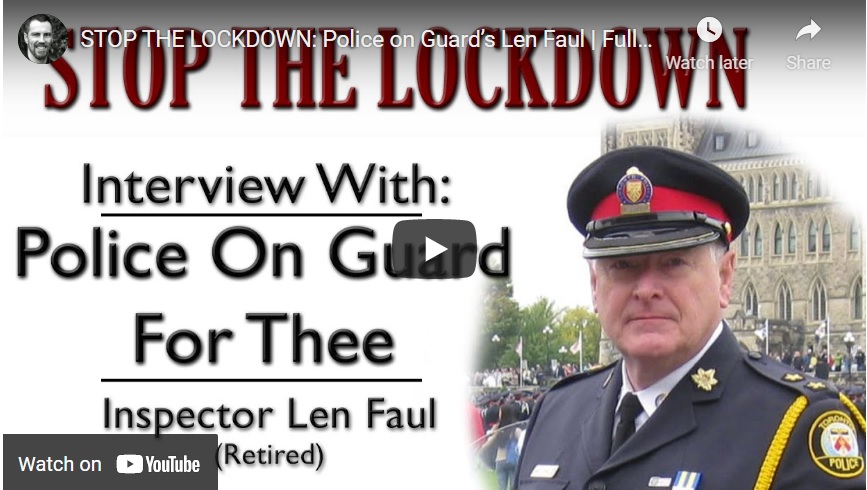In this March 2, 2021 interview, Julius Ruechel talks to retired police inspector Len Faul about the goals of Police On Guard for Thee, an organization formed by active and retired police officers. Faul begins by explaining the role of the police force in protecting the constitutional rights of all citizens. He says that many officers are now feeling the disconnect between their sworn duty the function they perform in coronavirus measures imposed by politicians. Faul adds that the the pandemic is not a policing issue, but rather a health issue which should be dealt with by the government in using a health-based approach. He goes on to relate how the police was never used in previous epidemics. Faul says that the police force is now being used as a strong arm of a tyrannical government, and the functions they currently serve are in opposition to the oath they have taken as police officers.
Despite the moral dilemma that the pandemic has presented to police officers in Canada, and the reality that each individual officer is liable for their personal actions on the field (for example, if an officer chooses to fire his gun during a demonstration, and ends up injuring someone, that police officer has to face a lawsuit), individual officers cannot simply oppose directives even when they know that these directives are blatantly breaching citizen’s rights. Officers who do so risk getting cited for insubordination, ostracized by colleagues, or worse, terminated. Faul says that we now know enough about the coronavirus, and that the lockdowns and restrictions that police officers are forced to implement are a breech of public trust. By taking to the courts, Faul, along with other members of the Police on Guard for Thee movement, hopes to restore citizen’s constitutional rights to freedom. By doing so, Faul says that they can protect police officers from legal repercussions, reprisals, physical harm, as well as relieve them of the moral turmoil that eats away at their conscience.
To end the interview, Faul sends this message to police officers: “Police officers are truth seekers, they rely on evidence. Now is no different. We cannot risk making wrong decisions, especially on behalf of the citizens we have sworn to protect. Their discretion is their greatest power. Your oath is your highest calling. We’re all members of the public and we’re all in this together.”
He also reminds citizens that the coronavirus restrictions have affected the police force in the same way that they affected regular citizens. They too, need public support in order for them to do what is right. He offers citizens some suggestions on how they can avoid arrest during demonstrations, as well as how they can strengthen the petition of the Police on Guard for Thee by engaging the local police board. As a final reminder to citizens, Faul says: “Stand up for your rights. Do not be complacent. Just because information comes from your government doesn’t mean to say that it is correct or true. Do your own research. Check alternate media sources. Listen to other experts, especially those that are being vilified because there’s a reason that governments vilify them. Open your eyes to what’s being done to you, our children, and our grandchildren, and to our most vulnerable, the elderly. Many of them got their lives on the line to gain for us these rights and freedoms we enjoy today. This must not be given away lightly.”
Editor’s Note: This article is a reminder that ALL of us regular citizens (whether private individuals or members of the police or military) are suffering from the incompetence of our governments. We are being pitched against each other, but the police and military are not our enemies. They, like us, have been a victim of the lies.
It is important that we retain our compassion for each other even as we speak up for our freedoms. But we must continue to find the balance between complacency and cruelty, between unity and individual action.
Read Online
Click the button below if you wish to read the article on the website where it was originally published.
Read Offline
Click the button below if you wish to read the article offline.
